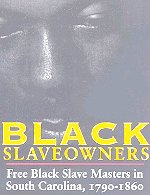One of the first slave owners in the American Colonies was a Gambian prince named Anthony Johnston. He came to the United States. After serving seven years as an indentured servant, he received his freedom, purchased land and slaves, and became a prosperous farmer. The well-being of the planter class at the expense of indentured servants' finding fewer opportunities to improve their lot following their freedom later incited Bacon's Rebellion. After the previous colonial governor was removed from power, the new status quo in Virginia would no longer permit blacks to own land. Later on, these laws would form the basis for the peculiar institution which permitted the enslavement of Africans in the South until the Civil War.
This change in social policy, however, did not put an end to black-slave owners. In addition to a significant minority of black slave owners in New York (before slavery was eventually abolished), the state of South Carolina, Louisiana, and Maryland still had a minority of black slave owners up to the Civil War.
One judge in New Orleans remarked that black slaveowners were more cruel to their slaves than white slaveowners. He witnessed these proceedings in his courtroom at times when matters of slave ownership came before his court. Whether his assertion is valid or not, however, does not diminish the more complex reality that slavery in the United States, although predominantly a white phenomenon, was ultimately a human problem, one which prospered in part from the slave trade in Africa, in which African tribes would sell members of their own people to traders.
For anyone who has further questions on this controversial topic, they can research these findings in Larry Koger's book "Black Slaveowners: Free Black Slave Masters in South Carolina, 1790-1860". Other sources include:
 |
| \ |
"DIXIE'S CENSORED SUBJECT: BLACK SLAVEOWNERS By Robert M. GroomsThe nature of slavery as a human problem also extends to white relations. In Eastern Europe for centuries, whites enslaved other whites, predominantly Slavic groups, from which the word "slave" is originally derived.
http://americancivilwar.com/authors/black_slaveowners.htm
THE BLACK SLAVE OWNERS By Joseph E. Holloway
http://slaverebellion.org/index.php?page=the-black-slave-owners
Al Benson Jr. "Proof, I Don't Gotta Show You No Stinkin' Proof",
http://www.sierratimes.com/albenson.htm
Edward J. Toner Jr. "USA: Free Blacks who owned Black Slaves", http://www.africancrisis.org/Ph_News_0678.asp
"Black Reparations Poll", http://209.157.64.200/focus/f-news/990659/posts (see posting by "B4Ranch", "To: Otis Mukinfus"); cites: "Selling Poor Steven", American Heritage Magazine, Feb/Mar 1993 (Vol. 441) p. 90.
Philip Burnham. "Selling Poor Steven" (abstract of the article "Selling Poor Steven" from the February/March 1993 issue of American Heritage, p.90-), http://www.philburnham.com/selling.html
See also: "Re: Black on Black: Black American Slaveholders", http://www.africa-forum.com/newreply.php3?action=newreply&postid=5836
Edward Toner. "An Untold Black History", http://www.ahherald.com/readers_write/2003/030123_untold_history.htm
"Carter Godwin Woodson", http://www.africawithin.com/bios/carter_woodson.htm
"Free Blacks Who Themselves Owned Slaves", http://rhodesian.server101.com/free_blacks.htm
Ed Toner. "Blacks Owning Slaves", http://www.thebirdman.org/Index/Others/Others-Doc-Blacks/Doc-Blacks-Slavery&Reparations/BlacksOwningSlaves-Toner.html
Michael P. Tremoglie. "The Black Roots of Slavery", http://www.churchseek.net/church/dayspring
In some sense, a fairly exhaustive list, in part because of the controversial nature of the subject has discouraged academics in the past.
Contrary to the multicultural narrative propounded by textbooks and liberal professors today, slavery is not exclusively a European invention that burdened Africans. This human problem roots out the greater issues that plague humanity, deeper than skin color.
No comments:
Post a Comment